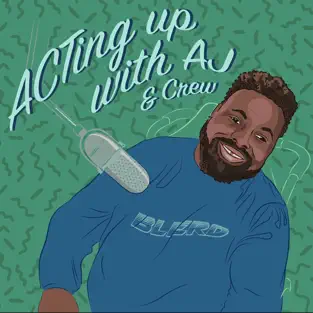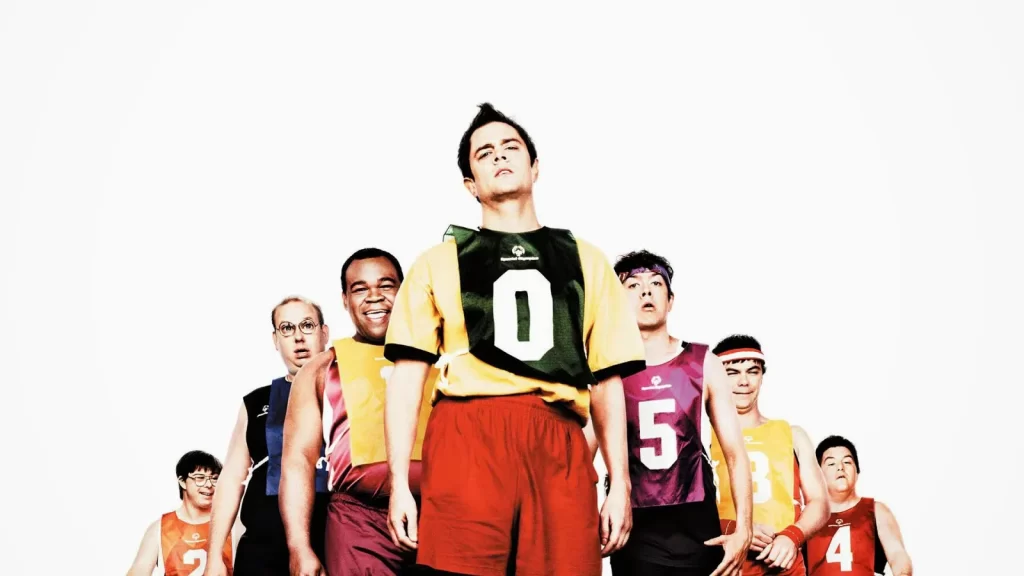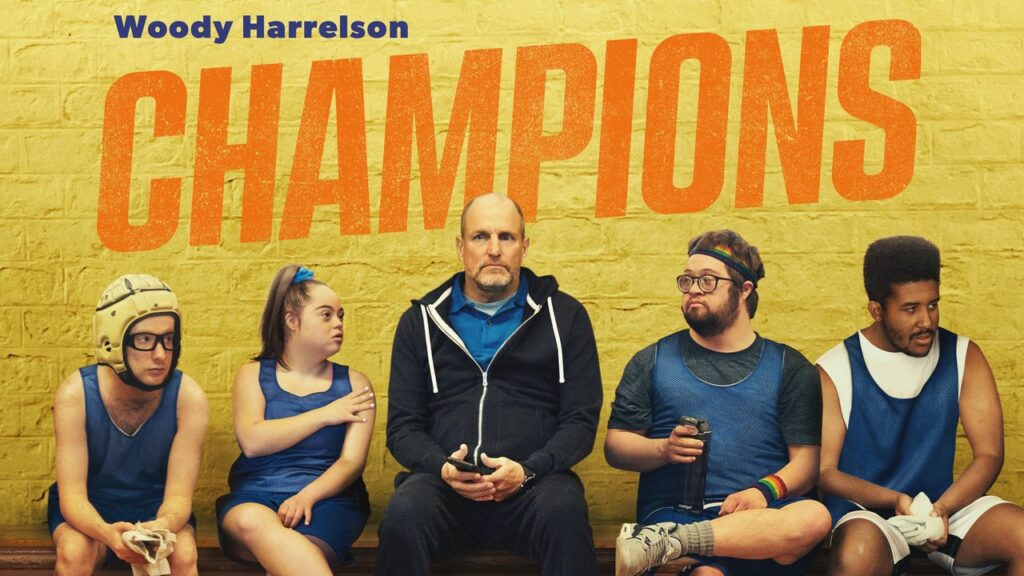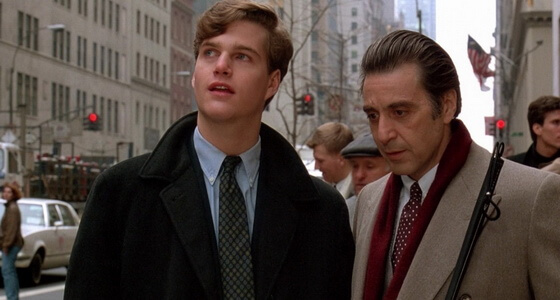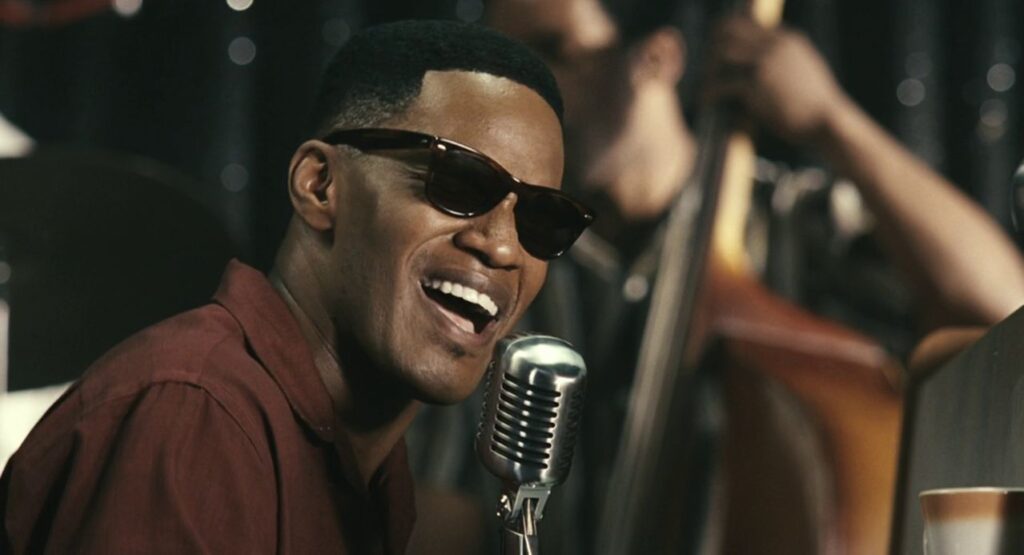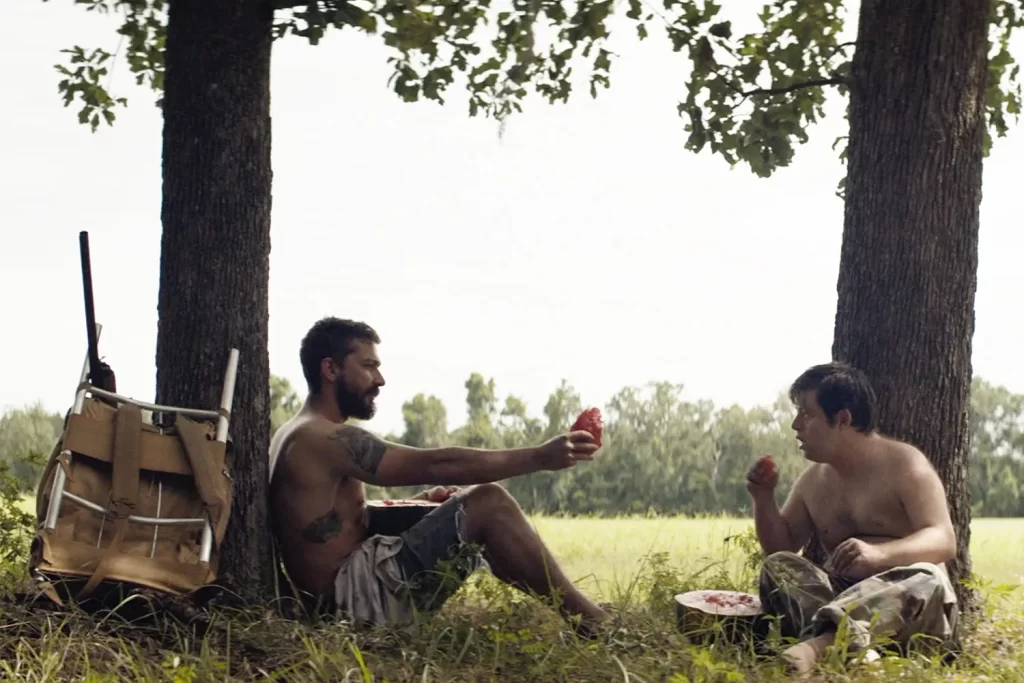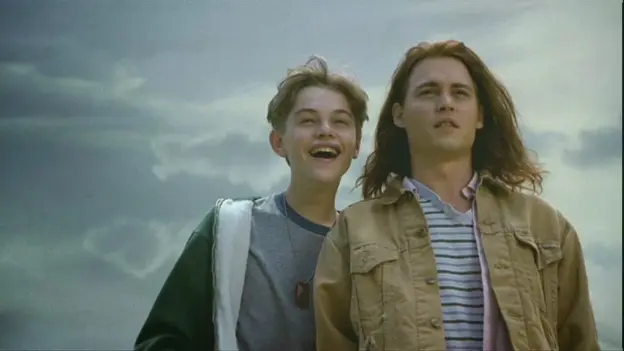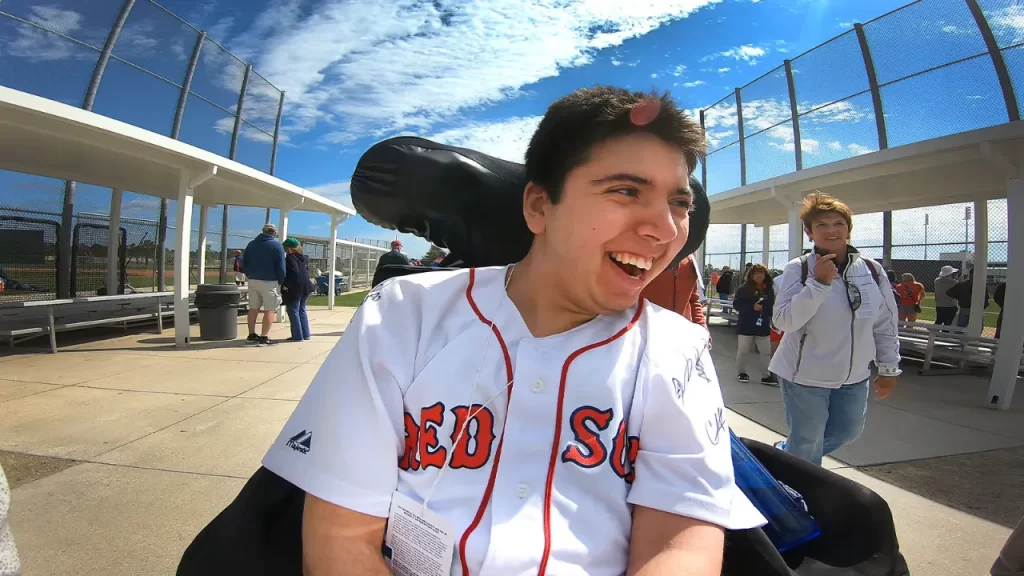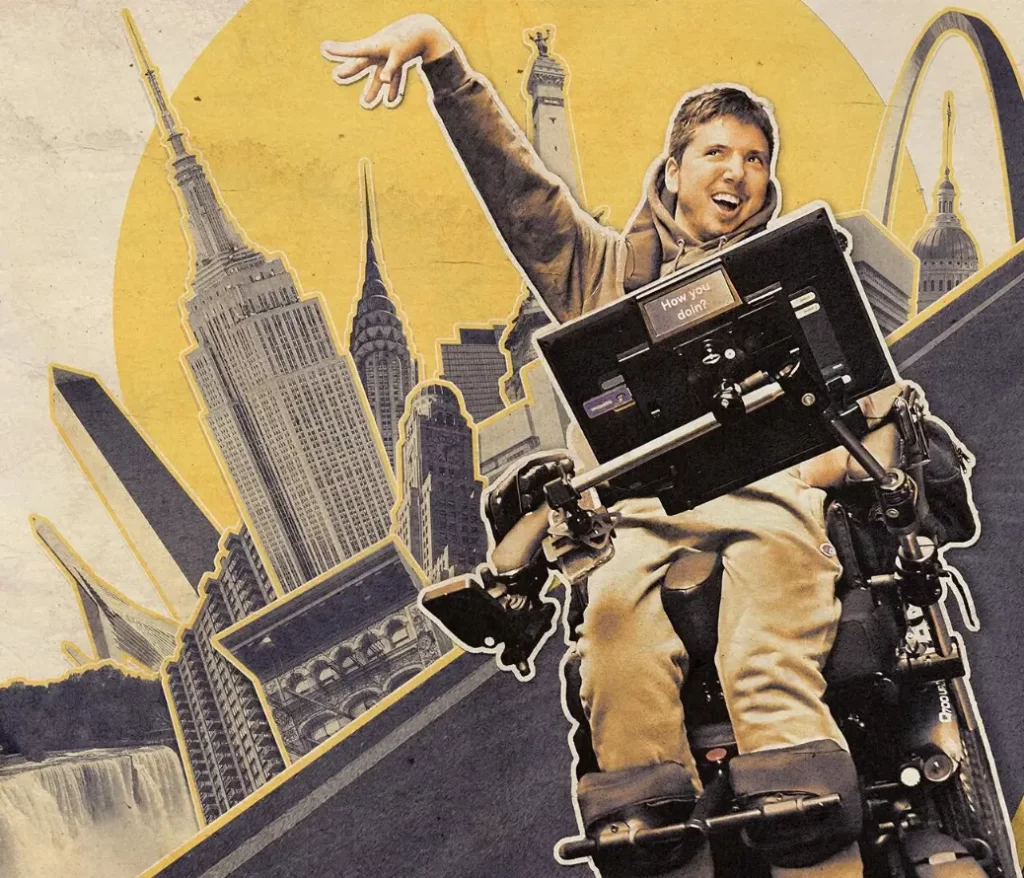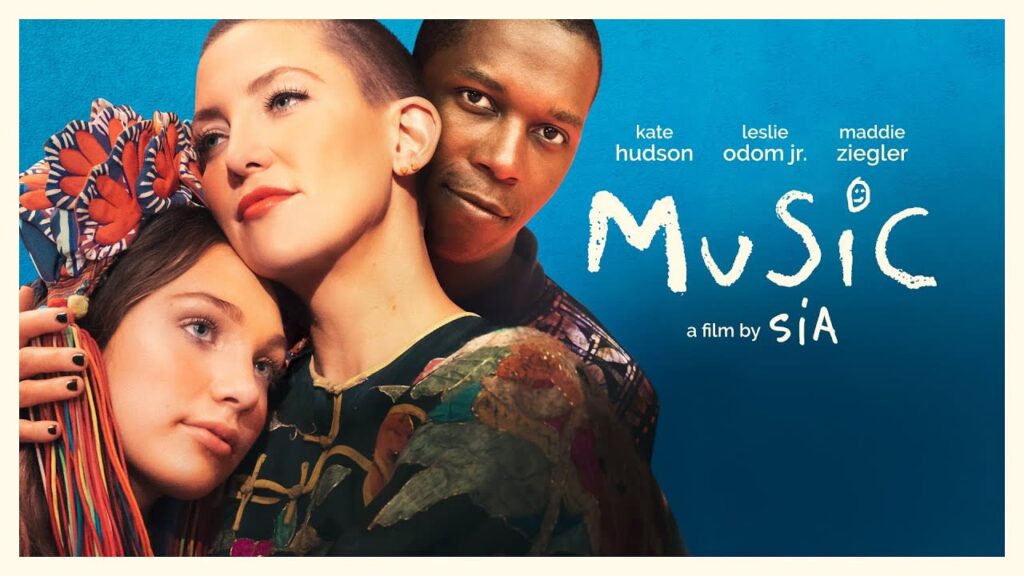A man imitates a disability in order to rig the Special Olympics for money. A movie as bad as it sounds? You might be surprised. We cover it all from Non-Authentic Casting, hiring 150 disabled Special Olympians, and will someone please strike down Uncle Gary with lightning.
News Feed – Privatizing Services for people with disabilities, Apple’s New Assistive Technology, Para-Olympic Coverage 2024
Content Round Up – NPR’s The Indicator from Planet Money “How video games became more accessible”
Disability Spotlight – Zac Gottsagen, Actor
Transcript
Intro
AJ: On today’s episode of ACTing Up With AJ and Crew, we’re gonna be taking it way
back to 2005! That’s right. We’re going back to Johnny Knoxville time when he was
white hot, and he had the movie The Ringer. We’re gonna be talking about the portrayal
of disability, authentic casting. We’re also gonna be talking about people’s attitudes
today versus back in the day. And we might get into some surprising, shocking truths
about the movie. Let’s get into it. It’s beyond the surface. It’s me and Shawnsy. It’s
episode #8 of ACTing Up With AJ and Crew starting right now! [bouncy electronica
plays through the next section of alternating conversation and film clips]
GARY: It’s a huge Latin word, uh, symptomus moronicus.
STEVE: You have to be highly functioning, developmentally disabled.
LYNN: All right! Nice, Jeffy. Good for you!
STEVE: [laughter]
AJ: We say in the disability community, “nothing about us without us.” And in that
situation, it certainly applied.
BILLY: Oh Mylanta, you are my woman.
SHAWNSY: Really, they were just playing slow, just for laughs, just playing stupid, or
just playing with some kind of lisp in some way, or some kind of physical defect without
actually thinking about what that disability was.
GLEN: You talk different.
AJ: People with disabilities can’t cut the mustard, or—
THOMAS: One time you talk one way, and now you, and now you talk the other way.
GLEN: Exactly!
AJ: The bar is very low, and so people think that we won’t be able to rise to the
occasion.
TALENT AGENT: Come on, Jimbo. All the great athletes say that after they win. Michael
Jordan said it.
JIMMY: Michael Jordan, kiss my butt.
SHAWNSY: Growing up in elementary and high school in the ‘90s, in the 2000s, like,
that was the way that you talked to friends.
BILLY: Oh, my stars, for the love of Liza. You scratched my CD!
MARK: Why’d you scratch his CD?! [electronica and recorded clips end]
Synopsis and casting for The Ringer
AJ: Okay, I’m going to give a quick summary of the movie The Ringer. Steve Barker,
played by Johnny Knoxville, finds himself in a predicament. He has to fire his friend
Stavi. Stavi is in an accident where he loses his finger. Barker cannot pay for it without
health insurance. Meanwhile, his uncle Gary, played by Brian Cox, accrues a huge
gambling debt. His uncle tells him to enter and fraud the Special Olympics. The Ringer
is available on Amazon Prime Video. Closed captioning and audio description are
available. Let’s start. Let’s name the cast.
SHAWNSY: Okay. The Ringer, starring Johnny Knoxville, Katherine Heigl, Brian Cox,
Jed Rees, Bill Chott, Edward Barbanell, Leonard Earl Howze, Geoffrey Arend, John
Taylor, Luis Ávalos, and 150 other disabled athletes for the Special Olympics.
AJ: That’s a big cast.
SHAWNSY: And the list goes on.
AJ: This movie came out in 2005.
SHAWNSY: Certainly controversial, mainly for the fact of Johnny Knoxville playing an
able-bodied person who is intim-, or impersonating a disabled person in order to rig the
Special Olympics.
AJ: Let’s just say looking at the trailer, I was…. Looking at the trailer, I was prepared for
quite a hot mess of a show. So, looking at the trailer, I was going, yikes. I felt, [long,
sharp breath] I felt a little squeamish and dirty just looking at the trailer!
SHAWNSY: My synopsis did not help with that fact either, on, and probably for most of
this controversy, on the fact that usually, people are just like, yeah, it’s a movie about
Johnny Knoxville impersonating a disabled person.
AJ: Yeah. I mean….
SHAWNSY: [laughing] That’s a big no-no.
AJ: Yeah.
SHAWNSY: Like, to anybody’s [unclear].
AJ: Boo! Let go into the premise a little bit more. So, he plays a guy who has a worker
who was cutting his grass. The worker loses his fingers. But he has no insurance, and
Johnny Knoxville’s character cannot cover the cost.
SHAWNSY: Yeah, being nice guy Johnny Knoxville in this movie hired this guy to mow
the lawn, and the first day of mowing, cuts his fingers off.
AJ: And he’s like, oh, my God. I don’t know what to do. Meanwhile, Uncle Gary, played
by Brian Cox, is in a bar, and he sees a commercial for Special Olympics. And he’s
like…. Now, I don’t know how his brain kind of concocts this, because I must say, and
this is nothing against the Special Olympics, but if I need a job, or if I need some quick
money, or if I had a friend that needed a job, the Special Olympics and portraying an
athlete that you’re not wouldn’t come to my mind first off, you know? And Uncle Gay is
basing this on the fact that Johnny Knoxville’s character was a track champion.
SHAWNSY: Yeah, they didn’t really dig into that too much. He brings it up once or twice
during the movie, but they don’t really [snickers] totally bring up that he won the 1500-
meter, I guess, in high school.
AJ: They just needed to tie the plot together. I ain’t mad. You know, you gotta do what
you gotta do.
SHAWNSY: Well, of course, his uncle convinces him to do the Special Olympics, and so
he starts impersonating a cognitively disabled person in order to fool the Special
Olympics into allowing him to compete.
AJ: And can you, before this, he did kind of…. Do you remember some of the movies
that he was referencing to get into the mindset of a disabled person?
SHAWNSY: Oh, yeah, he had I Am Sam, he had Forrest Gump, he had two other films
that were in it.
[recorded clips play]
[tender music on guitar plays through the first line]
GARY: [Southern accent] It doesn’t take a smart man to know what love is. I love you,
Jenny. [without Southern accent] Okay, now you try.
STEVE: Try what?
GARY: Acting like that. Come on, man. Start taking this seriously.
STEVE: Okay. [sighs, then takes on a Southern accent] I love you, Jenny.
GARY: Hey, hey! Commit.
STEVE: Hmm. [long pause, crickets chirping, then he speaks slower] I love you, Jenny.
GARY: Better, better. Something’s missing. You should drool.
STEVE: Okay, Uncle Gary! There you go. Good night.
GARY: Exciting. Isn’t it exciting?
STEVE: What?!
GARY: You’re acting again. [footsteps] Ooh, ooh, ooh ooh! We oughtta come up with a
slogan. Slogan! You know, like, “life is like a box of chocolates.” Or, “Here, take my
hands, boss”. Like that monster [bleep] from The Green Mile.
STEVE: Monster [bleep]. What’s wrong with you?
GARY: What?! Since when did [bleep] become politically incorrect?
STEVE: Goodnight, Uncle Gary. [a door slams shut] You’re going to hell.
[upbeat music plays]
STEVE: My name is Lance, and I like nuts.
STEVE: My name is [unclear], and I can count to potato!
STEVE: Hi, my name is Jerome. Could I have a slice of your doody?
[upbeat music builds, then fades out, then footsteps approach]
STEVE: Hello, my name is Jeffy, and I like to eat apples.
GARY: Hmm, hmm. Boogie woogie. [wheezing laughter] [recorded clips end]
SHAWNSY: Like, he was just watching it. And that was kind of like the joke, that he was
just watching not necessarily, again, able-bodied actors perform portraying a disability
on film and using that as his reference to be disabled.
AJ: Yeah.
SHAWNSY: Again, multiple times on this movie, they constantly reference on how poor
of a job he is doing at being disabled and the fact that his cohorts, his friends in this
Special Olympics competition, discover him in the first 30 minutes. They’re not fooled by
this.
AJ: Yeah, I must say, for those of you out there that are like, “Whoa, this is controversial.
I don’t even know if I wanna see this film,” well, that’s up for you to judge. But I will say,
the saving grace for me was the fact that the guys that were disabled were in on, they’re
in on the scheme because there is a very popular, very good track star, and he wins all
the time.
SHAWNSY: And this is Jimmy, right?
AJ: Yeah. This is Jimmy.
SHAWNSY: And Jimmy is a legitimate world Special Olympics Olympian. Like, he
actually does the international competitions.
AJ: Yeah, he is good at what he does. He’s a boss, and he’s very popular. He even
comes with his own entourage. He came in a beast-like limo like he’s the president or
something!
SHAWNSY: They do make him up to be, personality wise, a dick. Like, they make him
up to be an antagonist. Not because of his disability, but because he’s just a snob. Like,
he’s a rich snob that wins the Special Olympics every year.
AJ: My favorite line in the movie of his, he says, “Michael Jordan can kiss my butt.”
SHAWNSY: [laughs]
AJ: That’s pretty bold. That’s pretty bold.
SHAWNSY: Now, the other two that portrayed authentic casting was Edward Barbanell
and John Taylor that were both of Johnny Knoxville’s friends. But there were four other
disabled athletes in the main cast—
AJ: Played by comedians.
SHAWNSY: Played by Jed Reese, Bill Chott, Leonard Earl Howze, and Geoffrey Arend,
who are not actually cognitively disabled.
AJ: Now, why do we think this is? I tried to find out and do some digging around on the
internet, and we couldn’t find. So, we basically have to, we have to surmise and
speculate, and we think it’s more than likely to get more names in the movie.
SHAWNSY: Right. These are actors, like Jed Reese was on Galaxy Quest. I think
Geoffrey Arend was on Super Troopers as well, alongside Brian Cox. So these are
quote-unquote “well-known” comedians in the movie industry. They’ve done projects
before.
AJ: Yeah. And they’re, more than likely, they’re probably friends of Johnny Knoxville.
Comedians are very tight in that way. But yeah, so, it’s kind of there’s an extra layer of
controversy to it, not just because of the plot. And it’s controversial because there’s
these three other characters, and they’re not disabled. And they’re doing a very poor,
poor portrayal of disability, sub-par to—
SHAWNSY: Yeah, there wasn’t any declared what disability they had. We were
discussing this on like it was really they were just playing slow in the, just for laughs, just
playing stupid, or just playing with some kind of lisp in some way, or some kind of
physical defect without actually thinking about what that disability was.
[recorded clip plays with quiet, suspenseful music]
STEVE: Hello, Thomas. What’s going on, guys?
THOMAS: You are so busted. [music rises fast and loud, then cuts out]
MARK: You’re a faker.
THOMAS: A mother faker!
STEVE: Jeffy doesn’t understand. Jeffy cocoa for coo-coo puffs. Jeffy—
GLEN: Shut up with that, you stupid A-S-S.
BILLY: Yeah, we know you’re not special.
MARK: Yeah. You think you can fool us? “My name is Jeffy.”
STEVE: “Jeffy likes apples.”
MARK: “My name is Jeffy. Can I have a hug?” I’ve seen better acting on pornos.
RUDY: You’ll lay it on too thick.
THOMAS: Yeah, we do that too. One way, one thing.
GLEN: Yeah. Show hi what you did last year when Pamela Anderson came to see us.
MARK: Mm!
GLEN: Hey, not so aggressive.
MARK: Oh.
WINSTON: It took Pamela longer to catch on.
MARK: Yeah.
[long silence]
STEVE: [very quiet voice] I’m sorry guys. It was wrong of me to try and fool you.
RUDY: Duh.
THOMAS: Why would you do something like that?
STEVE: You got no idea what kind of pressure I’m under.
GLEN: What’s that mean, Jeffy?
STEVE: Hey, [sighs] it’s not Jeffy, it’s Steve. And it’s a long story. What happened was
that I work with this guy named Stavi, and I was sent to fire him, and I couldn’t. And
that’s how I got here.
BILLY: What?
WINSTON: Do you know what he’s talking about?
RUDY: I’m baffled, Jeffy.
STEVE: It’s not Jeffy, it’s Steve!
ALL: Ohhhhhh!
WINSTON: Oh, it’s not. It’s Steve, not Jesse.
MARK: Yeah.
STEVE: Yeah.
GLEN: Oh, I thought you said your name was Stavi.
STEVE: What? [recorded clip ends]
AJ: Which kinda goes into—and I’m not saying that they’re doing this, that they did this
on purpose—but it kinda perpetuates the idea that disability is disability. And like, we’re
all the same and we have the same needs and everybody is on the same level or
cognitive level. And that’s not true. There are many, many, there’s a whole array of so
many different kinds of disabilities, so many kinds of different autism. That’s why we call
it the spectrum, because there’s just so many. And even with the disabilities you know
of, no one is the same.
SHAWNSY: Right, right? And like, I don’t think it would’ve taken much to try and
research on those to pick, like pick Williams syndrome, pick autism, pick brain injury,
and be able to authentically portray that. It seemed like some of them were trying. Like, I
was thinking Jed Rees’s was trying to physically embody that, but it kinda came off a
little bit stiff, you know, like he was just doing facial expressions to look funny on screen.
AJ: Yeah, it makes me wonder. And again, I don’t know if it had anything to do with the
timing or the schedule that they had to make the movie. Maybe it was, you know, it was
kind of a smaller budget. With bigger films, there may be a lot of time out to do research
and to really dive in and really get to know your character and really submerge yourself
in the characteristics. And maybe because it’s a smaller budget film, a lot of times the
smaller budget films, you don’t have six months to shoot it or a year. You have 30 days,
or sometimes I’ve heard of even, I’ve even heard of some films being made in like 15
days, you know? So, maybe that was the case.
SHAWNSY: Now, but Edward Barbanell and John Taylor being in this production
schedule clearly had plenty of lines and clearly portrayed really well and had a majority
of the laughs. Especially Edward being the roommate of Johnny Knoxville was hilarious.
AJ: Really, really funny.
SHAWNSY: What I had kind of a bit of an issue, too, is just on the promotion of it as
well…. Like, with the cover of the actual DVD cover when we were looking at it, John
wasn’t on the cover. Edward was pushed off to the side with Johnny Knoxville and the
four able-bodied actors being silly, and then Edward also being in there, but being in the
back, which I was kinda like, I felt like Edward’s character, especially as the roommate,
was prominent in it and should have been more prominent in the promotion as well.
AJ: Wow. I didn’t know that. Or maybe I just couldn’t see it. But no, I remember you
telling me something about that, and who knows why people are left off posters. I don’t
know. I’ve heard of—not to go down that rabbit hole—but some stars of movies are left
off posters. The one that comes to my mind, the most famous one to me, is Ernie
Hudson in Ghostbusters. He is clearly, he comes in later in the film, but he’s a
Ghostbuster. And he is not in any poster or any of the promotional materials for the
movie.
Newsfeed
[chill music break]
AJ: Let’s go over and check in about the news that will affect disability culture. Today in
Newsfeed, we have a story about privatizing services for people with disabilities, and
Apple has made a big announcement about assistive technology and access needs.
Here to break it all down for us is our news wizard, Cheryl Green. Cheryl!
[epic news theme music]
CHERYL: Hey AJ, I’ve got a couple stories for you today. They’re really different from
each other, but both very interesting. The first one is called Private Equity Investment in
Disability Services Draws Scrutiny. And hey, commentary here. It’s about time. That’s
really great to hear because what are private equity investment firms doing in disability
services anyway? Back to the article.
“The US Department of Justice’s Antitrust Division, the Federal Trade Commission, and
the Department of Health and Human Services recently issued a joint request for
information about the impact of healthcare mergers, acquisitions, and other transactions
by private equity funds or other alternative asset managers, health systems, or private
payers.” That’s right, companies that deal in finances that own facilities that are
supposed to deliver care.
They made the request for information because they’re, “concerned that some
transactions may generate profits for those firms at the expense of patients’ health,
worker safety, quality of care, and affordable healthcare for patients and taxpayers.”
They accepted public comments through June 5th, and they asked to hear from patients
and healthcare workers about how their experiences in the healthcare system changed
after a facility or other provider where they work or receive treatment or services was
acquired and underwent a merger. I cannot wait to hear what comes of this one.
The other piece of news is definitely brighter: Apple to Roll Out New Accessibility
Features. “Starting later this year, Apple will offer eye tracking and other new
accessibility options on iPhone and iPad. Using the front facing camera, users will be
able to set up and calibrate their device within seconds to navigate apps, swipe,
gesture, and more, solely by focusing with their eyes. The functionality, which relies on
artificial intelligence, does not require any additional hardware or accessories. Apple
said all data will be stored on the device and not shared with the company.” iPhone and
iPad will also include more options like vocal shortcuts. With these, you can tell Siri to
do stuff using custom sounds instead of your speech. “A feature called Listen for
Atypical Speech uses machine learning to understand a wider range of speech
patterns” that might come along with some disabilities. Apple is also adding “the option
for live captioning to FaceTime and the ability to experience music through taps,
textures, and refined vibrations, among other accessibility enhancements.” Cool stuff!
There’s a really great group here, where I live in Portland, Oregon called CymaSpace,
and their mission is, “We make arts, cultural, and media events accessible and inclusive
to the Deaf and Hard of Hearing through technology, education, and outreach.” They’re
doing such incredible stuff with chairs that vibrate to the music, with all sorts of light
shows where the lights are tied to the sound.
And I bring up CymaSpace because I have noticed a trend when large companies like
Apple or Netflix or something like that, they do some great accessibility stuff, and then
non-disabled people and reporters and journalists will jump on it like, look at this
amazing new thing that somebody finally has come up with! And really, groups like
CymaSpace and other artists have been doing things like using texture and vibrations.
Myles de Bastion at CymaSpace has developed this incredible live captioning system.
Like, this stuff is out there in d/Deaf and disabled community. It’s great when it gets out
to the broader society. So we can be really grateful to Apple and be excited and share
the story about the accessibility stuff they’re doing. But let’s make sure that we always
remember that d/Deaf and disabled groups like CymaSpace have been doing this, and
it’s really great stuff, even though they don’t tend to get the kudos that a big company
like Apple will.
Breaking news! Paralympic Games Paris 2024 start in less than 100 days.
NBCUniversal plans to present the most comprehensive coverage of the Paralympics in
the US media history. This will be the 17th edition of this prestigious international event,
and the first time for Paris to host the Paralympics. Since audiences have made their
interest clear, this year’s coverage will have “more commentators on the ground, more
cameras at the venues, and more hours to watch than ever before, including everything
on Peacock.” This is the first time there will be NBCUniversal hosts onsite, including
several disabled hosts: Paralympic track and field athlete Lacey Henderson, disability
advocate Sophie Morgan, and five-time Paralympic gold medalist and Hall of Famer
Chris Waddell. This will be the first Paralympic broadcast with an inside look at the
Team USA house, which is home base for the athletes.
“Peacock will be the most comprehensive Paralympic destination in US media history,
with approximately 1,500 hours of live coverage across all 22 Paralympic sports set to
be presented throughout the 12-day event. There will be over 140 hours of coverage on
TV, and there will be closed captioning of every Paralympic event, regardless of
platform. There will also be audio description on all linear programming.” And if you
can’t wait for the games, NBCUniversal will present over 25 hours of live Paralympic
Team trials coverage across Peacock and CNBC in swimming and track and field.
Coverage of the Road to Paris for Team USA’s Paralympians begins on June 27th at 10
AM Eastern on Peacock with the US Paralympic Team Trials.
And while we’re here talking about the Paralympics, I will admit I have not seen the
show Rising Phoenix on Netflix. But what I have seen many, many times is the video of
the theme song, Rising Phoenix. It is absolutely incredible. And on Netflix’s channel on
YouTube, you can find an official lyric video, and that version has animated captions
instead of just closed captions. The words are on screen really giving you the feeling
and the energy of the music. This song is absolutely incredible. It was written and
performed by Toni Hickman, George Tragic, Keith Jones, and Daniel Pemberton. Rising
Phoenix won two Sports Emmy Awards, one of them being for Outstanding Music
Direction. The song and the video are just phenomenal. I can’t recommend them
enough. Back to you, AJ. [theme music fades]
More about authentic casting
SHAWNSY: We were also talking on like, why the comedians and the studio not wanting
to take risks. And that yes, they’re giving voice to people with Down syndrome, putting
them on the screen, but really, relying on actors that are well known to sell the picture.
AJ: Yeah. Which is something that we still are battling with today. We aren’t really sure
how to get around that. And that’s why there’s a lot more successful acting today. We’re
getting better with representation. But to my mind, and I’m not trying to sell anybody out
there, but we don’t have a box, we don’t have a Will Smith-level of disabled actor. I think
the biggest actor out there with a disability is Peter Dinklage, but he’s about the only
one. And even with Peter, like, I love his acting. But would you say he’s like [unsure of
name]? I don’t know. Although he blew up with Game of Thrones, but we haven’t gotten
to that A list yet, because a lot of the issue is like we can’t get the A-list roles because
they’re like, they’re always gonna go back. And I’m not saying this isn’t valid. We just
have to figure out how, we have to figure out how to do this. But they always go back to
we have to get butts in the seats, and so the person has to be known.
SHAWNSY: Right. ‘Cause if you compare it to Champions that also was about the
Special Olympics, just basketball, but still was Special Olympics, had an entirely
authentic cast in the team, that made half as much. That made about 18 million, while
The Ringer being a joke about, [scoffs] not being about, but at least the synopsis makes
it sound like it was a joke about disability, it made 40 million.
AJ: And probably because of the climate too. I think, I mean, I think The Ringer was
able to make money because of Johnny Knoxville. I think it matters all about timing. And
like you said, and we all know, Jackass was hot. I’m not that familiar with Jackass, but I
do know, like, I came up in the era of MTV, Jackass. Everybody was thinking of those
stunts. So, this movie probably made a lot of money because of Johnny Knoxville.
SHAWNSY: So, could a disabled actor have played any of these four roles that were up
there?
AJ: I definitely think so. And I definitely think that if…. I think so, especially, I just think it
came down to box office. It might’ve come down to saying, well, we don’t know about,
we can have people with disabilities in the background, because as Shawnsy said, they
did cast over 150 actors. But maybe they thought casting for more disabled actors, it
might’ve been too much. I think there’s a feeling, there has been a feeling—and I know
it was around back in the day—that people with disabilities can’t cut the mustard, or it’s
gonna cost too much money, or what are we gonna have to accommodate? Or are they
gonna be able to learn the lines? It’s just this, it’s just the thing of like the bar is very low,
and so people think that we won’t be able to rise to the occasion.
SHAWNSY: Yeah. I’m kinda very much looking at, okay, what is the character that’s
being portrayed? These were comedians, right? And in today’s society, looking at the
disabled comedian pool, it’s growing ever more and more and more as comedians are
being willing to put themselves out there and make jokes about it. And I think, like Lee
Ridley and Rosie Jones, these are people that are doing the stage and are doing the
work out there and can certainly be funny in a film while portraying their disability.
AJ: One of my favorites, and I hope to work with him one day—I have a dream project I
would love to work—but Josh Blue. If you wanna check out Josh Blue, he has several of
his stand-up specials are on Prime.
[recorded clip plays, starting with light laughter from the audience that builds]
JOSH BLUE: I would like to mention I have cerebral palsy. I like to get that out of the
way early in the show. [big laughs] I do talk about it a little bit. You know, there’s a few
reasons I talk about it. Number one is I’ve come to find if I don’t mention it, after a little
while, the audience is like…does he know? [pause for guffaws] That he has that?
[audience laughs and Josh chuckles] Another big reason is everything I talk about
comes from the perspective of a disabled person, right? I mean, this is all that I’ve ever
known. I guess I’ll admit that early in my career, I tried to do my show from a Southern
belle point of view. [big belly laughs] Could never get that to play quite right, you know.
[light laughter, then Josh takes on a Southern lilt] “Dear Diary. [laughter] Haven’t been
right since Mr. Earl left.” [big laughs, Josh giggles]
You guys are a fun crowd, man. [big laugh, then a pause] Although I could definitely say
there’s a few people still looking at me like…. [audience laughs] “What’s after this, a
midget juggler? Come on!” [big guffaws, applause, and whoops]
[audience laughter and cheers rise and fall several times, and Josh holds back laughs]
Yeah, Fernando. And you’re gonna love him. [big laughs and claps] Yeah, he can juggle
other midgets. [laughter] So if you are one, you know, [laughter] just be ready. [more
laughs] The bar might not be as dry after this. [laughter builds, then slowly fades, Josh
chuckles]
While you’re looking at me, that guy does not look dry at all, I’m telling you. [laughter]
This is clean comedy. You should take a shower first. [Josh and audience laugh] Thank
you, I do. I took two showers today. I just look dirty. I don’t know what it is. [laughter]
Weird being me. I gotta say, you guys, I gotta, since I live in, like, a dual world, I could
be walking down the street, and somebody comes up like, “Oh! Can I get an autograph?
I saw you on TV!” And then like, two steps later, like, “Get away from me, you drunk
ass!” [laughter, big claps] Either way, I ask for a dollar. [laughter and cheers erupt, then
audio clip fades out]
AJ: Shoutout to Josh Blue.
SHAWNSY: Yeah, yeah. I think the pool is big enough now, and I think there’s enough
people out there that we could do authentic casting with comedians in those roles. I
don’t think we have to rely on just anybody filling that. I think this film would’ve been
much better with that, with declaring what the disability was for each of these people
and then leaning on it. Champions did really well with some of those autistic characters.
They just had hilarious moments, and Down syndrome characters had hilarious
moments that were very true to their character.
AJ: And not just because, you know—this is a disabled podcast, so we bring more
representation of disability—but not just because it’s a right thing or a moral thing or,
you know. Well, it is the right thing to do, to cast for authentic representation. But the
story would’ve been that much richer because it’s true, and it’s really authentic, you
know, and it’s organic. And some things could come out organic from the experiences
that you’re trying to show on screen. If you had authentic casting, it would’ve come from
a more organic place and a much more real place.
Content Roundup
[chill music plays through the section]
AJ: Let’s go over to your Content Roundup. Today we have a story all about
accessibility in gaming. The story comes to us from National Public Radio, better known
as NPR. Here’s Michel Martin and the rest of the team over at Planet Money. [recorded
clip plays, transcript courtesy of NPR]
MICHEL MARTIN, HOST: For most of video game history, accessibility was sort of an
afterthought. But that was before 2020 when a company called Naughty Dog released a
game called The Last Of Us Part II. Our colleagues at The Indicator from Planet Money,
Adrian Ma and Wailin Wong take us through the shift around accessibility.
ADRIAN MA, BYLINE: It was around the age of 12 when Steve Spohn discovered video
games. He was at home, which is where he was most of the time because he has spinal
muscular atrophy.
WAILIN WONG, BYLINE: It's a condition that gradually takes away a person's ability to
use their muscles. And one time, one of the nurses helping him asked, have you ever
tried playing video games?
STEVE SPOHN: And I told her that I was too disabled. There's no way that I could. And
she challenged me that there was no reason I couldn't just hold the controller. I was
using a powered wheelchair, so why couldn't I hold the controller? And she brought over
a Nintendo, and it was like love at first sight. I ended up falling in love and beating
Mario.
WONG: Fast-forward to 2020 and the release of The Last Of Us Part II. Emilia Schatz is
a lead designer at Naughty Dog, the company behind the game. Years before its
development, she hadn't necessarily been thinking about how to make it more
accessible to people with disabilities. She was really thinking about how to make one of
her games available to her mom.
EMILIA SCHATZ: I mostly was just like, OK, I want my mom to play this game.
MA: But a big obstacle for her mom was learning the controller.
WONG: At the time, Emilia was working on a game called Uncharted 4. And she
thought, what if we added an option that players could turn on that would basically
simplify the controls? These new features didn't make a gamer out of Emilia's mom, but
they did get a lot of positive feedback from other people who played the game. And so
Emilia and her colleagues thought, what other options could they add to a game to
make it accessible to even more people, including those with disabilities?
MA: So, as Emilia and her colleagues started working on their next game, The Last Of
Us Part II, that question kind of snowballed. And after a lot of experimenting and
consulting with gamers with disabilities, the developers eventually added more than 60
different accessibility options to the game.
WONG: For example, players have the option to reassign what each switch and button
does, which could be really helpful for players with certain physical disabilities. Players
with hearing impairments could turn on multiple visual cues, and then there were
options aimed at people with vision related disabilities, people like Ross Minor.
ROSS MINOR: Crowing up, so many blind people, including myself, have developed
crazy, convoluted ways to play video games.
MA: Ross works as an accessibility consultant and actually specializes in video games,
which he says he's been playing since he was a little kid. He remembers back then, this
Pokemon video game was really hot, and even though he couldn't see the screen, he
adapted.
MINOR: I literally went home and got my Game Boy and memorized every single sound
in the game.
WONG: But there were certain games that Ross thought he would never be able to
play, what some call Triple A games.
MA: That is until he played The Last Of Us Part II, because it had all these accessibility
options for vision impaired players. There was a screen reader that helped him navigate
menus, a voiceover that described what was going on in scenes. And, oh, the sound
cues.
MINOR: Sound cues for when you need to vault over something…
(SOUNDBITE OF ELECTRONIC PINGING)
MINOR: …When you need to crouch.
(SOUNDBITE OF ELECTRONIC PINGING)
MINOR: It's truly a work of art.
WONG: But maybe his favorite feature was an option that allowed a player to send out
a sort of sonar pulse in the game.
MINOR: And then, like, in stereo, you know, it'll play, like, a sound to the left or a sound
far off to the right, and then you can track that object and it will guide you to it.
(SOUNDBITE OF ELECTRONIC PINGING)
MINOR: I'm not an emotional person, but, like, it literally brought tears to my eyes
'cause something like this was never done before.
MA: Since then, Ross says he's been seeing more and more game companies follow
that example.
MINOR: I have hope that, you know, this trend will continue. I'm 100% positive it will,
because at the end of the day, it also just makes great financial sense.
WONG: Right. Because a lot of people with disabilities play games. According to the
Census Bureau, about 13% of the overall population has some sort of disability. And
according to some estimates, the percentage is even higher in the gaming community.
Ross says it's a big market.
MA: Adrian Ma.
WONG: Wailin Wong. NPR News.
(SOUNDBITE OF GUSTAVO SANTAOLALLA'S "CHASING A RUMOR")
[recorded clip and chill music end]
AJ: Thank you to NPR’s The Indicator from Planet Money. You can subscribe to The
Indicator anywhere you get your podcasts. It comes out every weekday, and it’s always
ten minutes or less. Again, thank you to NPR. Now I’m back to more conversation.
You’re listening to ACTing Up With AJ and Crew!
Could this movie be made today?
AJ: We always ask the question, could this movie be made today? Now, me and
Shawnsy are kind of a little bit, well, Shawnsy wants to bring up some points that may
not be thought of on the surface. For me, I think in today’s climate, with so much
authentic representation and with the past couple of years for like the story coming from
the community that the story’s being told of, I don’t think that this could be made today.
Especially with the premise of, like, I’m going to get, I’m basically going to exploit
disability to get cash.
SHAWNSY: Yes. When you say like that, it’s, when you say the synopsis, yes, that was
the immediate reaction. And that was the exact synopsis I gave you because I
remember watching it when I was in high school and just watching it because of Johnny
Knoxville being on it, and we had it on DVD. And so, when I gave you the synopsis of
yeah, Johnny Knoxville rigs the Olympics for a girl and like, [laughs] it’s like, yeah, it
sounds horrible.
AJ: Yeah. I think, like I said, the saving grace about the movie is like, the guys pretty
much find out pretty early that he is not disabled. And also, Johnny Knoxville has heart
in the movie.
SHAWNSY: Yes.
AJ: And he realizes this is wrong. And he also becomes really good friends with the
group. And he, and even towards the end, he tells the truth. He says, like, you know, on
the spot—
SHAWNSY: On national television, you know. [laughs]
AJ: Spoiler. But even though the movie’s 18 years old, I just wanna say spoiler alert. He
does confess at the end, and he does. And you can tell, like, this is really in movie land
because after he does this horrible fraud and basically, he gets the girl. He gets the—
SHAWNSY: Well, he still does things with his disabled friends. Like, he does the theater,
like the local theater that is more his type ‘cause he always wanted to be an actor, his
character with a disability.
AJ: Yeah.
SHAWNSY: So he still has, like, even beyond the events of what the movie premise
was, he still continues on in the epilogue with those friends.
AJ: And just in case those out there wanna know, just updates on some character, one
in particular, Uncle Gary? Still the same.
SHAWNSY: Yeah. Let’s talk about Uncle Gary. That’s the first topic of being the
absolute symbol of what a dick looks like.
AJ: Yeah. And you can tell, like, in order for a bad person or a dick to be in this movie,
they said, Brian Cox, it’s gonna be you, sir. You can handle it.
SHAWNSY: Yeah!
AJ: And everything that you would think that is the most horrific thing that could be done
or said about disability is embodied in Brian Cox.
SHAWNSY: Yeah, it was him, and then the boyfriend character. Those two characters,
shown as being assholes, were the pretty much everything derogatory that came in the
movie came out of the mouths of those two characters.
AJ: So in one way, would you think that the boyfriend is worse? Because at least with
some jerks in life, even though they’re jerks and even though they’re asses, they are
who they are, and you, like, they’re just who they are. And they make no bones about it.
At least you know who they are, and you know you’re dealing with. With the boyfriend,
he’s kind of, has this nice shell and he’s got this, “hey, buddy!” attitude, you know?
SHAWNSY: Yeah. The “I’m gonna be an ally to get laid.”
AJ: Oh, yeah.
SHAWNSY: Right? Like, he was just doing, putting on a facade to be able to marry. He
was the fiancé, and he was cheating on her in that movie. And he was literally putting
on a facade just to act nice.
AJ: Yeah.
SHAWNSY: Which is certainly two types of characters that exist in the real world. Like,
there are those people that are out there. So they were exaggerations, but they were
literally put there to bring point to those assholes.
AJ: Yeah.
SHAWNSY: Now my only issue with this movie on those characters, even though the
boyfriend, Katherine Heigl, found out about it and dumped him and they never made it
together, great. But every time they were derogatory, there was never a moment where
it was like Champions, where as soon as the R-word came up, the guy got nutted.
[recorded clip plays]
MARCUS: That’s a boo boo word. [lands a punch]
HEADBAND: Oof! [recorded clip ends]
SHAWNSY: Like, the guy got hit or had something bad happen to him. And even Uncle
Gary at the end of the movie has a good standpoint where he ends off. He ends up
winning because he wins the bet and wins the money to do this, even though all this
stuff happens, and he was a bad person that had a good ending, which kind of sucks.
AJ: But no retribution, no penance for saying like, and no retribution for being an ass or.
There was no, like, you know, in some movies it would be some great music playing.
And they’re like, “I was wrong. I’ll never do that again.” And then the credits would roll.
[laughs] Not with Uncle Gary. And I think that may have something to do with, you know,
this is 2005, so early 2000s, coming out of the ‘90s. Even though there was discussion
about it and we were being more conscious about it, the R-word still rang free with no
limitations, and it was often used for comedic purposes.
SHAWNSY: There was a moment in the film where Johnny Knoxville was defending his
friends, but that’s as far as the movie went as for standing up to this asshole. There
wasn’t any further. It was just “don’t say that word. These guys are my friends, and
they’re amazing people.”
AJ: Cut to Champions. Woody Harrelson socked somebody in the balls!
SHAWNSY: [laughs] Yeah, right. Yeah, saying a boo boo word.
AJ: And he said, “It’s a boo boo word.”
MARCUS: It’s a boo boo word. [lands punch].
HEADBAND: Oof.
SHAWNSY: Oh yeah. They put a kibosh to it. Like, they literally was like, yeah, that’s a
no. You’re gonna get punished for it, and I hope you never say that again. They never
really did that with Uncle Gary.
AJ: And that word is, you know, we’re more conscious about not using it today. But I
grew up in a time where that word was always used, whether, you know, if you’re stuck
in traffic, “This is R.” You know, if you’re having a bad day or if you didn’t get the order of
food you want, “This is R,” you know.
SHAWNSY: That felt like the atmosphere that we grew up in, like, growing up in
elementary and high school in the ‘90s, in the 2000s, that was the way that you talked to
friends. And it was kind of one of those things that you didn’t even know what you were
even saying. You were just being derogatory towards your friend, calling them an idiot.
AJ: Yeah, yeah. And for me, I have personal pain with the word. I was abused with the
word, not by anybody in my immediate family. Nobody get too alarmed. But I was
abused with the word, and that word comes with a lot of pain for people. But just to
show you how not only derogatory words, but how the word was just out there, I
remember when I was a little kid, and I stayed with my dad, my stepmom works or
worked at the time in the field of people with disabilities. She worked in a group home.
And in the group home there was, so they would go out and they would go out. Their
transportation was like a regular school bus, but on the school bus, it said something
about, So-and-so, I forget the name of the business, “for the mentally…[bleep]” I’m just
gonna say the word, but only for this one time. And I was just thinking how back in the
day, it’s like, not, people felt like if somebody was cognitively disabled, it had to be
displayed everywhere as well. I don’t know. I don’t know if that’s a safety thing. I don’t
know if that was a thought at the time or letting the community know. I don’t know. But to
my mind, ever since I was a kid, I was like, I don’t know why it needs to be on the side
of a bus. This is like me catching a bus, and if the bus said, “This bus is for cerebral
palsy.” Like, I just don’t—
SHAWNSY: Yeah, it was segregation of the disabled. Like, it’s very similar to African
Americans growing up and the segregation that they dealt with. The disabled were
dealing with the very thing. It was an identifier that separated you from the— And
special education was like, we’re gonna push you to a totally different group of people.
AJ: Yeah. Like, in a lot of cases where it’s like you’re separate from the entire school.
Now, in today’s, I’m older, like, so I graduated, I’m 40 years old. So, I came up in the
‘90s, and let’s just say I’ve had both sides of it. I’ve been in situations where I was
primarily in special ed, and then I had times in my life where I was what they said
mainstreamed. But when I was in special ed, we were separated from the school. The
only thing that made us a part of the school was the fact that we went there, and we had
classrooms there, but we weren’t a part of the school.
SHAWNSY: Right. Yeah. And in thinking about going back to the R-word and
everything, it’s a rule, right? If you don’t know the rules to the board game, that’s quite
all right. But as soon as you know the rules and you continue to not play by them, then
you’re just an asshole.
AJ: Yeah, it’s simple folks.
SHAWNSY: It’s kind of like Lizzo’s situation with her song lyric calling it, saying “spaz”
and the community reacting to it, her recognizing it, and then changing the lyric.
AJ: Now, full disclosure, I have called myself spaz, but that’s because I have cerebral
palsy, and I’m what’s, my diagnosis is spastic quadriplegic. So, I just call myself that
because I have spasms, and it’s just a part of me. Like, it’s not something that’s wrong
or bad, or I don’t, I don’t use it to put myself down. When I was younger, I used to be, I
really wanted to be a DJ, and I DJed a couple times. I had some gigs, and my DJ name
was DJ Spaz, because I just thought that that was cool. Because the spasms is not all
of me, but it is a part of my physical makeup, as Shawnsy can attest to. Because you
help me, you lift me up, you help me get dressed, and I’m pretty sure that my spastic
body can be challenging.
SHAWNSY: On a good note for the movie, the directors and the writers gave 100%
control over the script to the Special Olympics, which the Special Olympics approved,
endorsed, and eventually helped in the casting of 150 disabled actors playing in the film.
AJ: And so, in that way, I know they probably felt really good because there was
approval in some way from the community, a large part of the community. And they
were able to cast over 150 actors. That is incredible. And I must say, like, that’s why I
said in the beginning of the opening of this episode, we wanted to go beyond the
surface ‘cause on the surface and looking at the trailer, like when you told me, Shawnsy,
that it was, they wanted approval from the Special Olympics and they got approval, they
had say, I was completely shocked, you know. But I think it’s a great thing that they had
approval of the script. Something that we say in the disabled community—and I think
this is applied, and I wanna salute the filmmakers and the studio—we say in the
disabled community, “Nothing about us without us.” And in that situation, it certainly
applied. And so, I wanna give props where props are due, and we’re always gonna,
we’re gonna be fair, and we’re gonna be honest to the best of our ability. But we’re
always gonna be positive and give props on the podcast.
SHAWNSY: Yeah. Kudos to the Farrelly brothers for kind of giving that say to the
Special Olympics.
AJ: Yes.
SHAWNSY: With that being said, so in my opinion of this film, I think Uncle Gary needs
to have retribution. There needs to be a lightning of some kind coming down for some of
the things that he says. And to be honest, to just remove that character as a whole,
make him an asshole, but don’t make him prominent. Like, I don’t really think he needs
to necessarily have as much of a starring role in it.
AJ: Yeah, yeah. That’s what I would say. And also, have all of the main casts, all the
principals, be disabled. Not only is it the right thing to do, but it just makes for a better,
richer story, you know? It just makes for a better story. You never know what could come
out of somebody’s authentic experience. And look, we say all the time, and comedians
say all the time: Comedy is truth, you know? And authenticness, I don’t know if I say it.
Authenticness breeds truth, you know. That’s how truth grows, so.
SHAWNSY: Yeah. So change those two things. Get those able-bodied actors replaced
by authentic casting, and give, get lightning strike on [laughs] Uncle Gary. Come on,
God. Just like strike him down. And then I think this movie would be an adequate movie
to make.
AJ: Yeah.
SHAWNSY: And it’s also kind of important, it was in 2005, especially, to give public
attention to the Special Olympics at a time that I didn’t even know about it. Like, I didn’t
really know what the Special Olympics were. I had a friend in high school, but really only
knew about him. He didn’t compete yet ‘cause he wasn’t really of age to start doing it,
so I had no idea. And The Ringer just brought attention that it even existed.
AJ: I’m just curious, what is the age for? Do you have to be an adult, or?
SHAWNSY: I don’t know. [typing] “Age to compete in Special Olympics.” Oh, you can
compete as young as eight years old.
AJ: Oh! Okay, well, I think this has been a really good episode. It’s been a lot of fun. And
hopefully, we’re just come in with our opinions, and we try to be as factual as possible.
But I think out there, we want the audience, we wanna bring these things. We wanted to
bring this film to the attention, and you make your own decision and have a good time.
SHAWNSY: A huge shoutout to Edward Barbanell playing Billy, the roommate to Johnny
Knoxville. To John Taylor playing Rudy, another friend. And then to also, to Leonard
Flowers, a Special Olympics Olympian who was the great antagonist of Jimmy. All three
had an amazing performance.
AJ: Incredible. So, thanks for joining us. We hope you join us next time. Peace.
Disability Spotlight
[chill ambient music]
AJ: And now it’s time for Disability Spotlight. If you remember all the way back in
Episode 4, we talked about the great movie Peanut Butter Falcon featuring my friend
and fellow actor Zack Gottsagen. Well, he has a brand-new television show and brand-
new movie coming out, and here to tell us more is everybody’s favorite funcle—that’s
fun uncle—Adam Grimes! Adam.
ADAM: Thank you, AJ. Great to be here. And just to clarify, do I put the fun in funcle, or
do I put the funk in funkle? Not the smelly kind, the…the musical kind. You know what?
Moving on.
Today in Disability Spotlight, we are so excited to feature Zack Gottsagen, not only
because of his amazing talents, but he’s also a part of our Zeno family and performed
alongside our very own AJ Murray in the Zeno production Bulletproof. Zachary, or Zack,
Gottsagen, is an award-winning actor and star of the 2019 indie hit The Peanut Butter
Falcon, alongside Shia LaBeouf and Dakota Johnson. The writers, Tyler Nilson and
Michael Schwartz, wrote the movie, The Peanut Butter Falcon, with Zack in mind. They
were so taken with Zack’s personality and talent that they wrote the script for him,
incorporating Zack’s mannerisms, way of expressing himself, his innocence,
enthusiasm, and joy for life into the lead role.
A little bit of history about Zack. He was the first child with Down syndrome to be fully
included in the Palm Beach School District and graduated as a theater major from the
Dreyfuss School of the Arts. After the Americans with Disabilities Act, the ADA, was
passed, Zack filed one of the first ADA suits, which successfully challenged Little
League to include children with disabilities, resulting in all coaches throughout the U.S.
being required to receive training in inclusion.
Now, Zack has won many awards, get ready, including the Quincy Jones Exceptional
Advocate Award from the Global Down Syndrome Foundation, Outstanding Breakout
Performance from Crested Butte Film Festival, the Rising Star Award from the Palm
Springs International Film Festival, the Newcomer Award from the Hollywood Critics
Association, and you know what? That list just goes on because that is how talented he
is. And though Zack is best known for his lead role in The Peanut Butter Falcon, Zack
also starred in the award-winning short film At Last on HBO Max, the music video by
Delta Spirit, What’s Done Is Done, and the feature film God Save the Queens. And
we’re so excited to spread the word that he is currently in production on the Netflix
thriller Night Always Comes also starring Vanessa Kirby, Jennifer Jason Leigh, Randall
Park, Stephan James, and Eli Roth. So keep your ear to the rail on that one, people,
because it looks incredible.
It is so hard to sum up Zack Gottsagen with so few words, but we gave it a shot. Go
back, see everything this young actor has done, and go see everything he’s up to next.
So, from your funcle, back to you, AJ!
Wrap-up
[epic theme music]
AJ: Thanks for joining us today. We hope you enjoyed today’s episode. As always, we
really enjoyed making it and producing it for you. So, for ACTing Up contributor Adam
Grimes, research contributor Jessica Marks, produced by segment producer Cheryl
Green, Shawnsy Billops, and yours truly, Ajani AJ Murray, come and join the crew next
time for another episode. We’re gonna be talking about the controversial movie Music.
JIMMY: Michael Jordan, kiss my butt.
